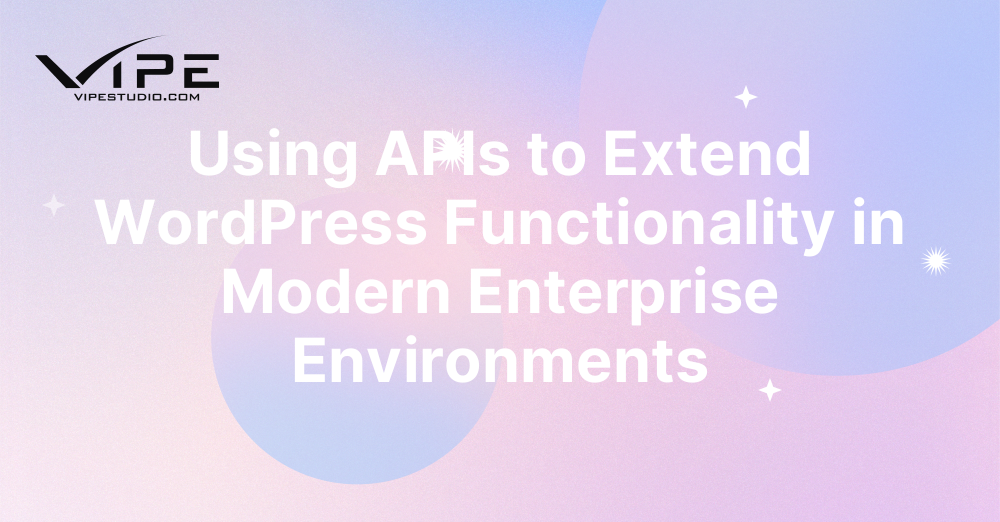27.05.2025
WordPress Development
Using APIs to Extend WordPress Functionality in Modern Enterprise Environments
READING TIME: MIN
Table of Content
As enterprise digital ecosystems become more interconnected, WordPress is evolving from a simple CMS into a dynamic content hub. One of the most effective ways to scale and modernize WordPress in such environments is by integrating it with other services and applications through APIs. This enables businesses to build flexible, responsive, and modular digital experiences that go beyond traditional web publishing.
Why API Integration Is Essential for Enterprise WordPress Projects
Modern enterprises rely on a variety of platforms—CRMs, ERPs, marketing automation tools, analytics dashboards, and mobile apps. Instead of trying to centralize all functions within WordPress, a better strategy is to connect WordPress to these tools using APIs. This allows content and data to flow seamlessly across systems without compromising performance or data integrity.
API-first development enhances scalability, enables real-time data exchange, and supports omnichannel experiences. For example, a product listing managed in a headless CMS can be automatically pushed to WordPress, while user engagement data collected on a WordPress site can feed into a CRM like HubSpot or Salesforce.
Exploring the REST API in WordPress for Custom Applications
WordPress includes a powerful REST API that allows developers to access, manipulate, and send data from the platform programmatically. This is especially useful for creating custom front-ends using React, Next.js, or Vue.js, or for exposing data to third-party platforms such as mobile apps or internal dashboards.
Some practical applications of the WordPress REST API include:
- Fetching blog posts to display in a mobile application
- Sending user-generated content from a front-end interface to WordPress for moderation
- Integrating external data into custom post types, such as real estate listings or financial reports
Headless WordPress and APIs: A Future-Ready Approach
The rise of Headless WordPress—where the CMS only handles content management and APIs handle the delivery—has made API integration more important than ever. In a headless setup, WordPress can be used solely as a content repository, while the front-end is built using a modern JavaScript framework such as Next.js.
This architecture allows developers to:
- Decouple the front-end and back-end for faster performance and scalability
- Create dynamic web and mobile applications using content from WordPress
- Implement advanced personalization and localization strategies based on API-driven logic
If you’re interested in learning more about headless integrations, check out our service page on Headless WordPress development.
Examples of API-Driven WordPress Enterprise Implementations
Enterprise organizations are already taking advantage of API-powered WordPress solutions in areas such as:
- eCommerce: Integrating WordPress with platforms like Shopify or WooCommerce for product management and checkout functionality
- Corporate portals: Syncing employee data from HR platforms or CRMs into intranet WordPress sites
- Content syndication: Distributing news, press releases, or documentation from a central CMS to multiple third-party platforms
Through smart API integration, enterprises can automate workflows, enrich user experiences, and reduce manual overhead across departments.
Partner with Vipe Studio for API-Centric WordPress Solutions
At Vipe Studio, we specialize in building scalable WordPress solutions that seamlessly integrate with enterprise platforms via REST, GraphQL, and custom APIs. Whether you’re implementing a headless frontend or synchronizing data between platforms, we provide the technical expertise to build secure, robust API connections tailored to your business logic.
Looking to future-proof your WordPress ecosystem? Contact us today to discuss your API integration project.
Conclusion: APIs Unlock New Possibilities for WordPress at Scale
By leveraging APIs, WordPress becomes more than a content management system—it becomes a central node in your digital infrastructure. Enterprises can integrate, automate, and innovate faster by tapping into the full potential of WordPress as a platform built for connectivity. From marketing automation to real-time data sync, the possibilities with WordPress and APIs are nearly limitless.
More on The Topic
- Navigating WooCommerce Performance: Real-World Strategies
- The Role of AI in WordPress Development Workflows
- Optimizing WordPress for Enterprise: Beyond Basic Caching
- WordPress and Headless Commerce: A Provocative Dilemma
- Decoupled WordPress Architecture: The Future or a Fad?
The content of this website is copyrighted and protected by Creative Commons 4.0.



